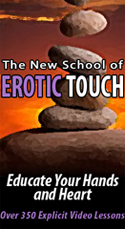Love Is Not A-Feeling
From Bluetruth
Published in What is Enlightenment, Volume 4, Number 2, Summer 1995. Reprinted here with permission from What is Enlightenment
I was asked to contribute an article for this magazine. I don't usually mix my teaching with others, but in this case I wanted to respond to Andrew Cohen's personal invitation. Since the magazine title asks the question, "What is enlightenment?" I will address that. Also, as the last issue was devoted to interviews with five distinguished traditionalists, it seemed appropriate to write about religious traditions and the spiritual life. And as I always put love first, I will write first about love.
I suppose the most radical part of my teaching at present is that love is not a feeling.
Everybody suffers from love, or the fear of it, or the lack of it. Why? Why is love so universally and inevitably heart-breaking, whether it be through the end of a love affair, the death of a loved one or being locked in with the habitual casualness or grim indifference of a partner? The answer is because we've been taught and conditioned by the world to believe that love is a feeling.
Love is not a feeling; it's a sensation. Drinking water when you're thirsty is a sensation, not a feeling. Being in nature or swimming in the sea is a sensation, not a feeling. Lying down when you're tired is sensational, not a feeling, although you may say it feels good. Feeling is an emotional interpretation of experience and these sensations don't need interpretation; they are just good or right. Making physical love rightly is a sensation, not a feeling. So is the love of God. The same goes for joy and beauty; both are sensational.
But in our ignorance we emotionalise joy, beauty and love. We make feelings of them, personal interpretations based on our old emotions. We put our personal past on the present with the result that joy, beauty and love don't seem to last. But it's our emotional substitutes that don't last and we become bored, discontented and unhappy again. The sensation or knowledge of joy, beauty and love is of course still there but it's overwhelmed by these coarser feelings.
Feelings are constantly changing. None is dependable for long. You can love someone intensely today, and tomorrow or next month not feel a thing. Except perhaps for the feeling of doubt or depression that what was so beautiful could change so quickly.
Feelings, even the best of them, turn to negativity - disappointment, anger, discontent, resentment, jealousy, guilt, etc. A good feeling starts off being elevating, exciting, like taking a drug substance, alcohol or having sex. But what goes up must come down and feelings are no exception. So in a couple of hours or days the down side starts and you perhaps wonder why you feel moody, depressed, suicidal or just plain unhappy. You're paying the piper for yesterday's music. And between the upside and the downside is the no-man's and no-woman's land of boredom, indifference, inertia, weariness and pointlessness.
Okay, so you don't have drugs, alcohol and sex but you love someone, as a feeling. Then it won't be long before you'll be experiencing one or more of the painful feelings I've mentioned above - and thinking it's natural! Wait and see. Even in every day living you're continually interpreting experience via your emotions instead of being the experience direct. "This is good, that's bad," your feelings swing subtly to and fro all day long obscuring the reality, the sensational knowledge or gnosis that it's not bad at all; it's simply life as it is.
All feelings are false and deceptive. And in the spiritual process the area of any person's life where they still have feelings is where the next stage of their unenlightenment will be addressed. So, where I come from, there's the answer to the magazine title, What is Enlightenment? Enlightenment is to be emptied (not empty) of feelings and thus at one with the pure sensation of divine being. And that pretty well sums up the whole spiritual process. But the spiritual process is so little understood that people don't realise their feelings are personal and false and have been misleading them all their life. If that's not true, why is humanity still unenlightened and basically unhappy after all this time - when enlightenment is the completely natural, sensational state of being every moment?
By disidentifying with your feelings you break your attachment to them. When that is done sufficiently you're back at the beginning, in pure sensation or unconditioned knowledge. You've been beating your head against the wall to get some feelings and all you've got to do is break the habit and get used to living anew without pain and conflict. But that's a mighty realisation, and a mighty simple one which few are going to accept - they'll be too busy defending their feelings! So, I guess I'll still be demonstrating this the day I die.
Incidentally, it seems to me that's why Andrew Cohen tells his students to be fearless and deadly serious. It takes that kind of one-pointed commitment to detach from the delusion of feelings and finally discover the blessing of the valiant; once freed of personal feelings the troublesome mind stops forever.
Now to traditions. I'm not a traditionalist and I didn't have an Eastern master. My teaching stems from my own gnosis and love and shares little common ground in practice with other teachings that invariably show an allegiance to Eastern traditions. I never deny the enlightenment of another enlightened spiritual teacher. Every enlightened teacher is doing his best in this matter, in this body of sense. But I am often critical of the hype and mystification that is inevitably associated with Eastern traditions in minds cultured in the West.
All spiritual traditions came out of the East. And the traditional Eastern way, particularly in the ancient Tibetan Buddhist and Indian Brahmic priest-ruled societies, was to seek enlightenment and to give the life, and often the lives of the children, to that pursuit.
This - the search for enlightenment - to me, is and was the beginning of spiritual ignorance. And it is the traditionalists that today unwittingly perpetuate this ignorance.
I am enlightened. No man is more enlightened than I am, and I am no more enlightened than any other enlightened man. Enlightenment is enlightenment. And that's that. It's an unalterable, unwavering state of knowledge and being beyond doubt, a completion every moment by grace of the Most High, the unspeakable one, God. That's the ultimate; the absolute being beyond any description. But the ultimate, the enlightenment of man, must translate into his living life. And to me and my teaching that means an enlightened man is liberated from unhappiness. Being and living free of unhappiness is the natural and simple state of all life on earth - except man. He has been misled away from it by spiritual lures and glamour and the result is the conflict and pain, the fluctuating unhappiness, of his short life.
Enlightenment can't be pursued or sought after. Even mentioning the word puts people further from the state. It gives the impression enlightenment is something to get that they don't have. This creates a multitude of inimical reactions; chasing it by following paths and ways; or feelings of discontent, self-doubt, frustration and inferiority; or the defensive ridicule of this most admirable and completely natural state of consciousness.
Today the carrot of enlightenment through priestly traditions continues to promise something to be gained in the future. Whether it is the Buddhist nirvana, the Christian heaven, the Islamic houri paradise, the Judaic Eden or the Hindu moksha, the prize is never now. Paths take time, ways take time, and traditions are the very stuff of time. So there's always the talk of time past in the form of Buddha, Jesus, Moses, Mohammed or other past masters and what they supposedly said or did.
Truth is the reverse. Truth is here now; no past, no future. People are unenlightened only because they believe in the truth of the past and therefore must look to the rewards of the future. To be enlightened, to return to the original state of life on earth, requires action now in the present with no reference to the past. What has to be done is to kill the old priest in you, starve out the traditionalist, the follower, the believer.
If you go to think about what you should do next to become more enlightened, don't. The thought is the priest trying to get you to think of what some teacher or so-called master said instead of being responsible for your self and the truth now. If you see yourself discussing enlightenment, stop; it's the unenlightened priest talking. If you want to run from the present difficult situation, don't; it's the priest giving you more time to suffer again. If you want to wear clothes of another culture midst the people of your own culture, don't; it's the priest wanting to dress up, impress and glamorise himself. If you are moved to shave your head for spiritual reasons, don't; it's the priest getting up to his old tonsorial tricks when your only concern is being what you are now.
In other words, to be enlightened of the acquired burden every spiritual belief and notion has to be abandoned, every reference to what any spiritual teacher or master has ever said must be set aside.
What does that leave? Your own experience. Not your historical or memorable experience, for that's the problem. Your own experience is your self-knowledge of life. Let's establish once and for all what this means now. Forget everything I've said in this article except this question: Do I want to suffer or not suffer NOW? That's the only truth for you. There's no tradition, no past, no discussion in it. It's all you need. Keep it with you and at the next temptation to suffer it will prevent you suffering.
But only if you've learned in your own experience what causes you to suffer. If you haven't learned that, you're still attached to suffering and will unwittingly embrace it. In that case you have to read on, take more time and ask yourself more questions.
Have you learned yet that you only suffer when you think about events or feel about them, that you don't suffer from events themselves?
Have you learned yet that every thought about yourself is a thought of the past, that worry is thinking and that all thinking eventually leads to worry, fear and insecurity? If so, each time you go to think, or catch the thinker thinking even about "good" things like last night's movie, don't; stop. Not because Barry Long says so but because you've realised the truth of thinking in your own experience. It's what you've learned from life, not from someone else's experience. Therefore it is the truth for you now and every moment. Otherwise you must go on thinking and go on suffering. One day, when you've had enough of the pain, you'll come to your senses.
Have you learned yet that every feeling is a feeling of the past and that every "good" feeling soon changes and eventually becomes the feeling of doubt, confusion, boredom or sorrow? If so, stop believing your feelings; don't act on them; wait.
Action will happen in its own time. Action taken on strength of feelings inevitably leads to more feelings to correct the action previously taken - and so the feelings of discontent and conflict, and corrective actions go on and on repeating themselves. If in your own experience you haven't yet learned the truth of the deception of feelings, then you just have to go on believing and thinking, having faith in the past and hope in the future, being happy today and unhappy tomorrow, but never being in command of your own life for long.
What about compassion? Compassion is another word like enlightenment that Eastern-based teachings have ritualized, taken out of context. This influences followers to try to be compassionate. But compassion is natural. Any concept or thought of it is phony. You can't try to be or do anything that's natural; it's already there. What has to be done is to stop indulging what's not natural in you- such as suffering. Trying is trying to get something for yourself, the sufferer. And compassion is the absence of self or personal suffering. Only then, in the absence of motive, can the one and only compassionate God be compassionate as God sees fit, and not as selfish man imagines. No self means no selfish intent, no personal satisfaction, no personal feeling of achievement, no personal decisions or choices. Compassion then is simply an activity of divine being and not of any person.
Is suffering humanity (suffering under its own self-delusion) really served by the hoary old story of the bodhisattva who supposedly out of compassion refrains from entering nirvana and chooses to save others instead? Where is he? If he's not here now he's a phantom of the imagination distracting people from the truth of being now. And anyway, in the enlightened state life unfolds without the burden of choice or alternatives. You just do as you do.
Barry Long



